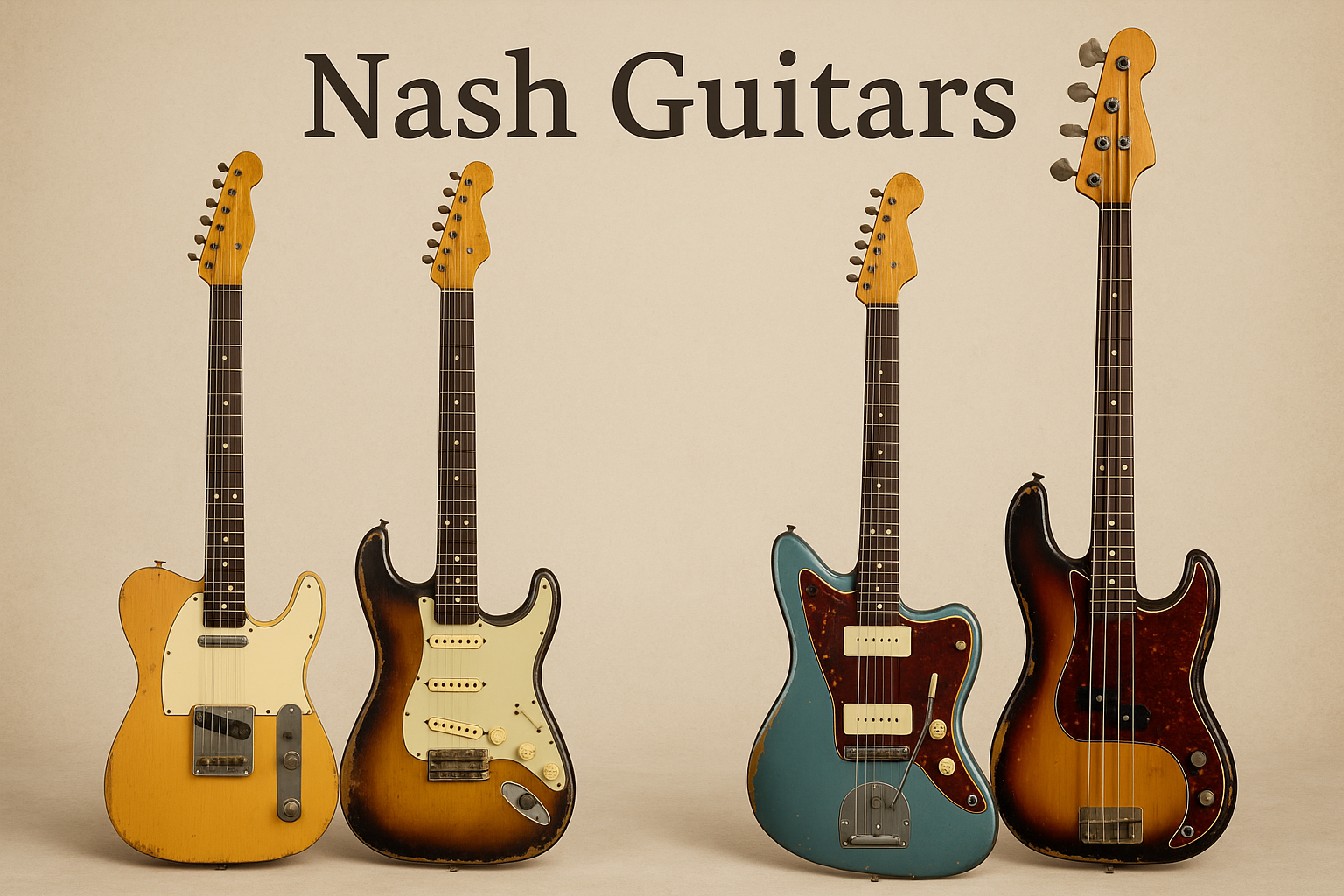The History of Nash Guitars
Founded by Bill Nash in Olympia, Washington, Nash Guitars emerged in the early 2000s with a singular mission: to build guitars that looked, felt, and sounded like well-worn vintage instruments—without the boutique price tag or fragility of true relics.
Bill Nash was initially a passionate hobbyist, modifying and relic’ing guitars for himself and friends. As demand grew, he turned his side project into a full-time operation. His approach combined vintage-correct tonewoods, aged nitrocellulose finishes, and carefully selected aftermarket pickups (often from Lollar, Fralin, or DiMarzio) to recreate the mojo of old Fender-style instruments.
Each Nash guitar is hand-assembled and finished with a level of attention to detail that’s earned the brand widespread acclaim from working musicians, vintage purists, and tone chasers alike.
The Nash Lineup: Vintage Vibes with Modern Playability
Nash Guitars primarily builds Fender-style bolt-on instruments, focusing on T-style, S-style, and offset designs. While the guitars are inspired by classic Fender models, Nash adds subtle modern refinements to enhance playability and tone.
Here’s an overview of their key models:
-
T-Series (e.g., T-52, T-63, T-72):
Based on the Telecaster platform, the T-series includes early blackguard-style builds (T-52), 60s-style rosewood board variants (T-63), and dual-humbucker thinlines (T-72). Aged finishes and period-correct hardware give these guitars an authentic feel.
-
S-Series (e.g., S-57, S-63):
Inspired by Stratocasters, these models come with vintage-style neck shapes, aged plastics, and traditional tremolos. The S-57 emulates a maple-board Strat from the late ‘50s, while the S-63 reflects rosewood-board ’60s models.
-
JM-Series (e.g., JM-63):
Based on the Jazzmaster, this series incorporates upgraded electronics and more stable hardware while retaining the dreamy offset aesthetics and wide single-coil tones.
-
JB and PB Basses:
Nash also produces relic’d versions of Jazz and Precision basses, known for their punch, warmth, and authentic vintage thump.
-
Custom Options:
Nash allows for considerable customization—neck profiles, pickup configurations, aging levels, and finishes can all be tailored to player preference.
Notable Artists Who Play Nash Guitars
While Nash Guitars aren’t heavily marketed through major artist endorsements, their quality has earned them a spot on stages and in studios worldwide. Here are a few notable Nash players:
-
Walter Becker (Steely Dan):
Known for his meticulous ear, Becker used a Nash T-style guitar during late-career performances.
-
Scott Sharrard (Gregg Allman Band):
Sharrard has favored Nash T-series guitars for their vintage tone and responsiveness.
-
John Shanks (Producer, Bon Jovi, Sheryl Crow):
A top producer and session player, Shanks has used Nash guitars both live and in studio sessions due to their reliable vintage character.
-
Jimmy Wallace (Guitarist, Dallas International Guitar Festival):
A respected player and tone connoisseur, Wallace has praised Nash’s relic work and tonal authenticity.
Because Nash guitars are often used by working musicians and session players, they’re often spotted in live rigs and recording credits more than high-profile endorsements—part of their boutique, under-the-radar charm.
Why Players Love Nash
What sets Nash apart is the combination of:
-
Aged Nitro Finishes: Each guitar is hand-relic’d to look and feel decades old.
-
High-End Pickups: Bill Nash installs premium pickups tailored to each guitar’s tone profile.
-
Vintage Vibe, Modern Reliability: You get the sound and look of a pre-CBS Fender with modern neck stability, fretwork, and intonation.
-
Affordability (Relative to Custom Shop and Boutique Builders): While not cheap, Nash guitars offer exceptional value compared to Fender Custom Shop relics.
Final Thoughts
Nash Guitars has carved out a unique niche by building guitars that feel broken in from day one. Whether you’re a Tele twanger, a Strat surfer, or an offset experimenter, Nash offers soulful tone machines that look like they’ve already lived a thousand gigs.
For players chasing the golden era of tone—without mortgaging a vintage original—Nash is a name worth knowing.









